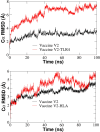Multi-epitope-based vaccine models prioritization against Astrovirus MLB1 using immunoinformatics and reverse vaccinology approaches
- PMID: 40074425
- PMCID: PMC11719404 (VSports)
- DOI: 10.1016/j.jgeb.2024.100451
Multi-epitope-based vaccine models prioritization against Astrovirus MLB1 using immunoinformatics and reverse vaccinology approaches
Abstract
Astrovirus MLB1 (HAstV-MLB1) is non-enveloped RNA virus that cause acute gastroenteritis infection. Despite research progress about infection and pathogenesis of HAstV-MLB1, Currently, no vaccine has been developed to effectively combat this pathogen. The current study is based on immunoinformatics and reverse vaccinology approaches to design next-generation, multi-epitope-based vaccine models against HAstV-MLB1. Genome-wide whole proteome data of HAstV-MLB1 strain was retrieved, and a series of analyses were conducted to explore effective B and T-cell epitopes that hold significant antigenic nature with no toxicity and allergenicity VSports手机版. A set of vaccine constructs were designed by different combination of lead B and T-cell epitopes with diverse linkers and adjuvants sequences. The model vaccine structures were analyzed via rigorous criteria of physiochemical properties, antigenicity, and molecular docking with HLA and TLR4 immune receptors to ensure their efficacy and safety. Based on the lowest binding energy of -82. 48 kcal/mol against the HLA receptor, the MLB1-C2 vaccine model with β-definsin adjuvant was prioritized for molecular dynamic and immune simulations analyses to assess its stability and immunogenic potential. These analyses revealed that the MLB1-C2 construct has feasible molecular stability and potential to boost strong immune responses in the host cell. Besides, the model was predicted to be non-toxic, non-allergenic, and antigenic, ensuring broad population coverage and capable to elicit a robust immune response. The in-silico cloning analysis highlighted a possible gene expression potential of the MLB1-C2 construct in E. coli commercial recombinant vector molecule. The findings of the current study provide an essential template for the development of a advanced next-generation effective vaccine against HAstV-MLB1. .
Keywords: Acute gastroenteritis; Human Astrovirus MLB1; Immunoinformatics; Reverse vaccinology; Vaccine designing. V体育安卓版.
Copyright © 2024 The Author(s) V体育ios版. Published by Elsevier Inc. All rights reserved. .
Conflict of interest statement
Declaration of Competing Interest The authors declare that they have no known competing financial interests or personal relationships that could have appeared to influence the work reported in this paper.
Figures












V体育ios版 - References
-
- Kumthip K., Khamrin P., Ushijima H., Maneekarn N. Molecular epidemiology of classic, MLB and VA astroviruses isolated from< 5 year-old children with gastroenteritis in Thailand, 2011–2016. Infect Genet Evol. 2018;65:373–379. - PubMed
-
- Moser L.A., Schultz-Cherry S. Pathogenesis of astrovirus infection. Viral Immunol. 2005;18:4–10. - PubMed
-
- Wei H., Kumthip K., Khamrin P., et al. Triple intergenotype recombination of human astrovirus 5, human astrovirus 8, and human astrovirus 1 in the open reading frame 1a, open reading frame 1b, and open reading frame 2 regions of the human astrovirus genome. Microbiol Spectr. 2023 - "V体育官网入口" PMC - PubMed
-
- Holtz L.R., Bauer I.K., Jiang H., et al. Seroepidemiology of astrovirus MLB1. Clin Vaccine Immunol. 2014;21:908–911. - "V体育官网入口" PMC - PubMed
LinkOut - more resources
Full Text Sources
VSports手机版 - Research Materials
Miscellaneous
